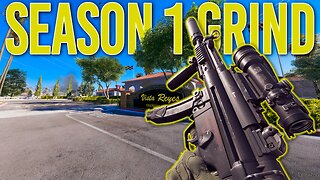Premium Only Content

Prepping Stream with panel including FastGroup and Steve Gosney
Prepping, short for "preparation," refers to the practice of individuals or groups taking steps to prepare for a variety of potential emergencies or disasters, such as natural disasters, economic crises, power outages, or even societal breakdowns. Preppers typically seek to become self-reliant and self-sufficient to better handle adverse situations. The level of preparedness can vary widely, from basic emergency planning to more extensive and long-term strategies.
Here are some common aspects of prepping:
Food and Water Storage: Preppers often store non-perishable food items and clean drinking water to sustain themselves and their families during emergencies. This can include canned goods, dried foods, and water purification methods.
Shelter and Clothing: Ensuring adequate shelter, clothing, and bedding for various weather conditions is crucial. Some preppers may have backup generators or alternative heating sources.
Emergency Medical Supplies: Basic first aid kits and medical supplies are essential. More advanced preppers may learn first aid and basic medical procedures.
Security and Self-Defense: Some preppers focus on personal safety and may acquire self-defense skills and weapons for protection. This can include firearms, personal alarms, or self-defense training.
Energy Sources: Alternative power sources, such as solar panels, generators, and backup batteries, can be important for maintaining electricity during power outages.
Communication: Preppers often have means of communication, like radios (including ham radios), to stay informed about the situation and contact others.
Financial Preparedness: Preppers may set aside an emergency fund, invest in precious metals, or develop skills that are marketable in a crisis.
Skills and Knowledge: Learning survival skills, such as foraging, hunting, and basic agriculture, is a fundamental part of prepping. Knowledge of first aid, navigation, and other practical skills is also valuable.
Bug-Out Plan: Many preppers have a plan for evacuating their homes (a "bug-out" plan) if the situation becomes too dangerous or unsustainable. This includes having a "bug-out bag" with essential items.
Community and Networking: Some preppers join or form communities or networks of like-minded individuals to share knowledge, resources, and support in times of need.
It's important to note that while prepping can provide a sense of security and preparedness, it's not without its criticisms and controversies. Some view it as an overreaction to relatively low-probability events, and there are concerns about hoarding and a lack of community focus in some cases.
Ultimately, prepping is a personal choice, and the level of preparedness one pursues can vary widely based on individual beliefs, values, and perceived risks. If you decide to engage in prepping, it's advisable to stay well-informed, have a balanced approach, and ensure your preparations align with your unique circumstances and needs.
-
 LIVE
LIVE
ThePope_Live
2 hours agoRedsack with the boys Cheap, Jah and Nova!
179 watching -
 LIVE
LIVE
Hernandez2787
5 hours agoArc Raiders - 1st Playthrough/ Celebrating My Anniversary as Sergeant First Class in the US Army
64 watching -
 48:42
48:42
Donald Trump Jr.
7 hours agoCommunism vs Common Sense, What's Next for NYC? | TRIGGERED Ep.289
137K270 -
 LIVE
LIVE
JahBlessCreates
2 hours ago🎉Big Vibes - Gaming with Cheap, Pope, and Nova
34 watching -
 1:31:25
1:31:25
The Charlie Kirk Show
5 hours agoTHOUGHTCRIME Ep. 104 — Post-Election Palette Cleanser + Tucker/Fuentes Interview Reaction
98.7K36 -
 4:22:59
4:22:59
tminnzy
4 hours agoSmooth Moves Only 💨 | Naraka: Bladepoint Chill Gameplay | !gx
32.1K5 -
 1:04:33
1:04:33
BonginoReport
7 hours agoWill The LA Dodgers Dodge WH Visit?! - Nightly Scroll w/ Hayley Caronia (Ep.172) - 11/06/2025
62.9K78 -
 3:23:13
3:23:13
Tundra Tactical
8 hours ago $0.02 earnedDadlefield Game Night BF6 New Update Weapon Grind
37.1K5 -
 15:39
15:39
Megyn Kelly
8 hours agoTucker Carlson on Why He Interviewed Nick Fuentes and What He Wanted to Convey To Him
80.1K89 -
 1:14:10
1:14:10
Kim Iversen
7 hours agoZionists PANIC Over Muslim Mayor In NYC
105K215